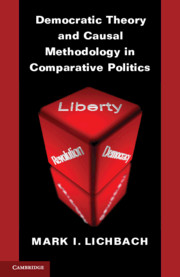Book contents
- Frontmatter
- Contents
- List of Tables
- Preface
- 1 Methodology’s Problem, and Democracy’s Too
- Part I Rationalism and Constructivism
- Part II State-Society and Contentious Politics
- Part III Conclusions: Three Chapters, Five Themes, and Twelve Theses
- 7 Agency
- 8 Research Schools
- 9 Political Power and Democratic Performance
- References
- Index
7 - Agency
Published online by Cambridge University Press: 05 May 2013
- Frontmatter
- Contents
- List of Tables
- Preface
- 1 Methodology’s Problem, and Democracy’s Too
- Part I Rationalism and Constructivism
- Part II State-Society and Contentious Politics
- Part III Conclusions: Three Chapters, Five Themes, and Twelve Theses
- 7 Agency
- 8 Research Schools
- 9 Political Power and Democratic Performance
- References
- Index
Summary
Taking its cue from the contentious politics approach, Section 7.1 urges comparativists to study the causal agency of individuals (Thesis 1), groups (Thesis 2), and democracies (Thesis 3). Section 7.2 suggests that the three types of collective agency be examined in conjunction with three corresponding moral dilemmas: ought/is (Thesis 4), freedom/power (Thesis 5), and democracy/causality (Thesis 6).
CAUSAL AGENCY
People have causal agency with respect to democratization. This section begins by urging comparativists to explore how causal mechanisms and processes operate at the level of the individual.
Thesis 1. Individual and Agency. Adopt an internal perspective on the self-understandings of agents struggling for democracy: individuals hold values and beliefs, are moved by intentions and motives, and make strong evaluations and political judgments.
Slighting the importance of values and beliefs, intentions and motives, and evaluations and judgments, Moore (1966: 421–22, 485–87) famously focused on material structure. Rejecting theories explaining how culture intervenes between structure and action, he offered a thin theory of human agency. The texts examined here also avoid this important piece of the causal puzzle behind democracy’s origins.
- Type
- Chapter
- Information
- Democratic Theory and Causal Methodology in Comparative Politics , pp. 125 - 176Publisher: Cambridge University PressPrint publication year: 2013

